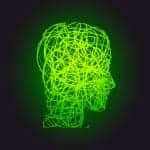Podcast: Download
Subscribe: Apple Podcasts | RSS
 You’d like to have psychic powers, wouldn’t you?
You’d like to have psychic powers, wouldn’t you?
Go on. Admit it. Life would be easier if you could read the mind of your friends and lovers. And you could be rich overnight by divining the insights of the best stock pickers alive.
But the reality is that psychic powers do not exist. Or at least, there’s no meaningful evidence to suggest that they do.
Yet the question is, why do so many people believe in psychic powers? Why are tarot readings and crystal divinations and all kinds of claptrap so attractive to so many people.
Perhaps some of the answer to these questions involves working memory. So in this episode of the Magnetic Memory Method Podcast, let’s talk about how.
What is working memory?
Working memory is the system that is responsible for holding and processing new and already stored information – for a short time.
Having working memory is important for reasoning, comprehension, learning and memory updating.
As a term, working memory is generally used synonymously with short term memory. Yet, the two concepts are distinct and should be distinguished from one another.
Whereas working memory is a theoretical framework that refers to structures and processes used for temporarily storing and manipulating information, short-term memory refers to the short-term storage of information, and does not entail the manipulation or organization of material held in memory.
Given these facts about working memory, it seems clear that it plays a roll in why people believe the psychics and their readings.
Here’s why …
First off, psychics overwhelm their clients with questions. By asking them to access so much about their past (sometimes including their past lives), it can be difficult, if not impossible to remember the questions the psychic asked.
As a result, the person sitting for the psychic reading will only remember the hits and not the misses. “Hits,” just to define this term, is the word used to describe any time a psychic gets something right. “Misses” refers to any time the psychic gets something wrong.
As we’ll see, talented psychics use language as a tool for increasing the recall of hits and obliterating our memory of the misses.
Magicians know how to use this effect as well. For example, they use what is commonly called misdirection. But in reality, they use …
Focused Attention
Houdini, of course, noticed this and worked to debunk how psychics work. He was especially concerned because by using your focused attention, you are not misdirected as such. Rather, your attention is directed to the wrong things. The audience then remembers only the big moves the magician makes, and should they have spotted the small moves in which the dirty work is done, the cognitive overload of the big moves erases the memory of anything else.
In fact, the most rewarding compliment a magician can hear is, “but he didn’t do anything.” In these cases, the big moves have been so natural or ordinary that they have no meaning for working memory to grasp onto.
But “misdirection” isn’t the best word for this technique. A better term would be focused attention. To “misdirect” is to draw attention away from something. But sleight of hand works best when concentration is so focused on innocent movements that it cannot pay attention to the dirty ones.
Psychics use the exact same process, but in this case, instead of calling it sleight of hand, we should call it …
Sleight Of Mouth
Psychics often hide their moves by asking questions that for most people will generate “yes” answers.
Drawing from Ian Rowland’s excellent The Full Facts Book of Cold Reading, here are some of those questions. Follow along and think about how many of these questions would generate a yes from you.
- Have you recently come across some old photographs, some in albums, some that still need to be properly arranged?
- Have you recently thrown out some medical supplies that had gone out of date or expired?
- Have you recently thrown out or donated some old books, toys or clothing?
- Is there a note on your fridge or by the phone that is no longer relevant but you haven’t yet thrown away?
- Are there any stuck drawers or drawers that don’t slide properly in your home?
- Do you have keys that you cannot remember what locks they belong to?
- Do you own a broken watch or clock you’ve been meaning to get fixed?
- Have you ever had an accident or near-accident involving water?
- Is the number 2 in your address or does someone significant in your life have the number 2?
- Do you have a scar on your elbow or knee?
- Is there a blue car or truck parked across the street from your home or work?
- Do you carry photos of a loved one in your wallet or purse?
- Is there a set of earrings that you’ve lost one half of? (For a man, the psychic can ask the same question about the jewelry collection of a girlfriend or wife.)
And so on.
Chances are that you probably answers yes to a significant number of these questions. All of them rely on accessing your long term temporal memory and often your spatial memory.
Whether you say yes or no, the psychic will quickly overload your short term working memory by saying “yes and” or “no but,” a tactic identified by the great magician and mentalist Kenton Knepper.
To illustrate how this works …
Imagine the following psychic reading …
Psychic: Have you or someone in you family recently experienced an illness?
Client: Yes …
Psychic: Yes and they needed to take some medicine for that?
Client: No …
Psychic: No, but they did eventually get well on their own.
By stringing together a long series of questions linked by “yes and” plus “no but” statements, the psychic creates the illusion of always being right. In reality, the psychic is right about general aspects of life that almost certainly must be true.
They can heighten this effect by gauging the age of the client. For example, if the client is young, the psychic might not ask them about illness in the family. But the older the client is, the more likely they or a family member has experienced an illness.
By asking questions that cause the client to access the general past and then helping the client link their answers to “yes and”/”no but” statements, the psychic completely overloads and distorts the client’s working memory.
The client will not only think that the psychic knew an overwhelming amount of info about them. The client will distort the experience and remember things that never happened during the psychic reading.
Magicians also create this distortion effect. I’ve seen it many times. For example, years later people will ask me to repeat magic tricks I once performed for them. But the trick they describe bears little resemblance to the trick I actually performed. Due to the powers of focused attention and the words I used during the trick, working memory becomes the enemy of reality and long term memory is tricked into remembering miracles better than even the best magicians are capable of creating.
Psychics do not have super powers.
Rather, they are masters of memory (just not in the way we would normally use that term). Psychics overwhelm working memory by distorting the present with leading questions and tricky language that creates paths toward their desired results.
They use our memory against us to exploit our desire for certainty in life and create false impressions that encourage us to take out our wallets again and again for more of the same.
How to Defeat Psychics At Their Own Game
The way to test a psychic is to use the very same tools against them and overwhelm their working memory.
For example, if a psychic gets a hit, you can answer with “yes and” or “no but.” Like this:
Psychic: Have you experienced an accident involving water, either in the recent past or when you were younger?
Client: No, but I did fall off my bike and scarred my knee in the center of the city with no water around. Didn’t you know that?
Or:
Psychic: Am I sensing it right that you or someone close to you had the number 1 or 3 in you address?
You: Yes, we both do, and I also have 4 and 6 in my postal code as does everyone in my neighborhood. Why don’t you know that?
By using the “yes and” and “no but” principle to your advantage, you will overload the psychics own working memory with tracking their own errors.
They will start to seem like a bad lawyer who can’t track any of the details going on in the courtroom and soon lose the case.
And so, now you know how your working memory can be used against you and how you can use working memory against them in your defense.
So get out there and have a blast and see how you can’t extend your new knowledge to other areas of life where advertisements, politicians and teachers are also using working memory against you to distort your perceptions and even control entire aspects of your life.
Further Reading

 You’d like to have psychic powers, wouldn’t you?
You’d like to have psychic powers, wouldn’t you?



Great article!!!! Thanks 🙂
Thanks for stopping by, Virginia. Glad you enjoyed it. 🙂
Good article, I like that you brought this up. Mnemonics do have parts of its history in mentalism and illusionism (Harry Lorayne).
Not all mnemonists are aware of Harry Lorayne as the godfather of modern mnemonics, while Dominic O’brien is someone people I’ve met usually refer to when they tell about their source of initial learning mnemonics.
I have noticed from own experience, that people with short/bad/blurred attention span are more likely to believe in psychics.
And that some of those that are extroverted in the sense that they are babbling a lot tend to think they are psychic.
I totally agree in the perception that most are just using selective awareness in the psychic sessions and have a HUGE positive default bias towards psychic nonsense.
Never the less, it IS cool when you see good cold readers in action. Some are better in that art than others.
I enjoy your podcasts, and hope to enjoy it a lot more on future!
So glad that you posted this excellent comment, Pelle.
Yes, I agree that Harry Lorayne is the godfather of modern mnemonics. I have a podcast episode about this called Harry Lorayne Memory Improvement And The Magic Of Mnemonics.
It’s interesting what you say about people with a short attention span. They most certainly would be susceptible, and of course psychics, mentalists and magicians all rely on the human habit of distorting memory. This has been especially troubling when it comes to hypnosis used to “shape” eyewitness testimony. I’ve talked about that in this episode of the podcast called The Surprising Truth About Hypnosis and Memory Improvement.
Thanks again for your great contribution. I look forward to your next post! 🙂
I was wondering what you thought of online psychics. Seems they are everywhere and the host companies make a lot of money. What are your thoughts?
Thanks for your comment, Maxine.
I’m suspicious of all psychics, regardless of whether they operate online or off. There are test conditions under which psychics could demonstrate the validity of their claims, but none ever do. Magicians and mentalists, on the other hand, gladly share ways by which the same outcomes can be achieved. The reluctance of one party to validate and the ability of the other party to replicate strongly suggests that fraud pays well on either sides, but the virtue always lays with the honest party.